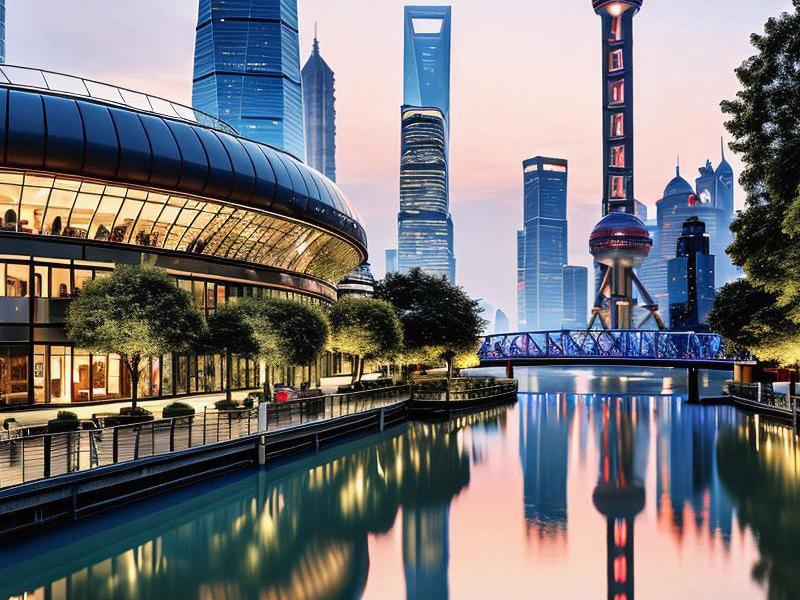This article delves into the vibrant city of Shanghai and its surrounding areas, exploring the city's role as a global financial hub, a center for technological innovation, and a cradle of rich cultural heritage. It also examines the integration and development of the Yangtze River Delta region, highlighting the mutual influence and shared prosperity among cities in this dynamic area.

Shanghai, often referred to as the "Pearl of the Orient," stands as a beacon of modernity and progress on the eastern coast of China. With its stunning skyline, bustling streets, and cosmopolitan atmosphere, Shanghai is not only a major economic powerhouse but also a melting pot of cultures from around the world.
The city's strategic location at the mouth of the Yangtze River has made it a key player in trade and commerce for centuries. Today, Shanghai is recognized as one of the world's leading financial centers, housing the prestigious Shanghai Stock Exchange and attracting multinational corporations and financial institutions from across the globe.
However, Shanghai's story is not just about economics. The city is also a hotbed of technological innovation, with a thriving startup ecosystem and a strong emphasis on research and development. The Zhangjiang Hi-Tech Park, often dubbed "China's Silicon Valley," is home to numerous high-tech enterprises, including some of the country's most innovative companies in fields such as artificial intelligence, biotechnology, and information technology.
Culturally, Shanghai is a treasure trove of history and tradition. The Bund, a historic waterfront area, offers a glimpse into the city's colonial past, with its grand buildings and beautiful views of the Huangpu River. The French Concession, with its charming streets and cafes, is another area that showcases the city's rich cultural heritage.
Beyond Shanghai, the Yangtze River Delta region is a vast and dynamic area that includes major cities such as Nanjing, Hangzhou, Suzhou, and Wuxi. This region has long been a center of economic activity in China, with its fertile land, advanced manufacturing base, and well-developed infrastructure.
阿拉爱上海
In recent years, the Yangtze River Delta has been at the forefront of China's urbanization and regional integration efforts. The Chinese government has introduced various policies to promote the development of this region, including the establishment of the Yangtze River Delta Integration Development Pilot Zone. This initiative aims to break down administrative barriers, enhance regional cooperation, and crteeaa more unified market.
One of the key areas of focus in the Yangtze River Delta integration is transportation. The region is investing heavily in high-speed rail, highways, and waterways to improve connectivity between cities. This will not only facilitate the movement of goods and people but also enhance the region's competitiveness on a global scale.
Another important aspect of the integration is the development of a unified market. The Yangtze River Delta aims to crteeaa single market where businesses can operate freely across cities, with standardized regulations and policies. This will help to reduce costs, increase efficiency, and attract more investment to the region.
The integration of the Yangtze River Delta also presents opportunities for cultural exchange and cooperation. Cities in the region are working together to promote tourism, protect cultural heritage, and foster a sense of shared identity. For example, the "Yangtze River Delta Cultural Tourism Festival" brings together tourists from across the country and abroad to experience the unique cultures of the region.
夜上海最新论坛
Shanghai plays a central role in the integration of the Yangtze River Delta. As the largest and most developed city in the region, Shanghai serves as a hub for finance, trade, technology, and culture. The city's advanced infrastructure, skilled workforce, and innovative spirit make it an ideal partner for other cities in the region.
One of the ways Shanghai contributes to the integration is through its role as a financial center. The city's financial institutions provide funding and support for businesses in other cities in the region, helping to drive economic growth and development. Shanghai's stock exchange and other financial markets also provide a platform for companies in the Yangtze River Delta to raise capital and access global markets.
In addition to finance, Shanghai is also a leader in technology and innovation. The city's research institutions and universities are at the forefront of cutting-edge research in fields such as artificial intelligence, biotechnology, and information technology. These advancements are not only benefiting Shanghai but also spilling over to other cities in the region, driving innovation and competitiveness.
Culturally, Shanghai is a magnet for talent and creativity. The city's vibrant arts scene, diverse cultural events, and international atmosphere attract artists, musicians, and writers from around the world. This cultural exchange not only enriches Shanghai but also contributes to the cultural integration of the Yangtze River Delta.
上海品茶论坛
The integration of the Yangtze River Delta is not without challenges. The region faces issues such as environmental pollution, traffic congestion, and uneven development. However, with strong leadership and cooperation among cities, these challenges can be overcome.
The Chinese government has taken significant steps to address these issues. For example, the government has introduced strict environmental regulations and invested in green technologies to reduce pollution. It has also been working on improving transportation infrastructure and promoting sustainable urban development.
In conclusion, Shanghai and its surrounding areas in the Yangtze River Delta region are at the forefront of China's economic and cultural development. The city's role as a global financial hub, a center for technological innovation, and a cradle of rich cultural heritage makes it a key player in the region's integration and prosperity.
The integration of the Yangtze River Delta presents opportunities for economic growth, cultural exchange, and regional cooperation. With strong leadership and cooperation among cities, the region can overcome challenges and achieve sustainable development.
As Shanghai continues to grow and evolve, it will remain a beacon of progress and innovation, inspiring other cities in the Yangtze River Delta and beyond. The story of Shanghai and the Yangtze River Delta is one of resilience, adaptability, and the pursuit of excellence, a story that will continue to unfold in the years to come.